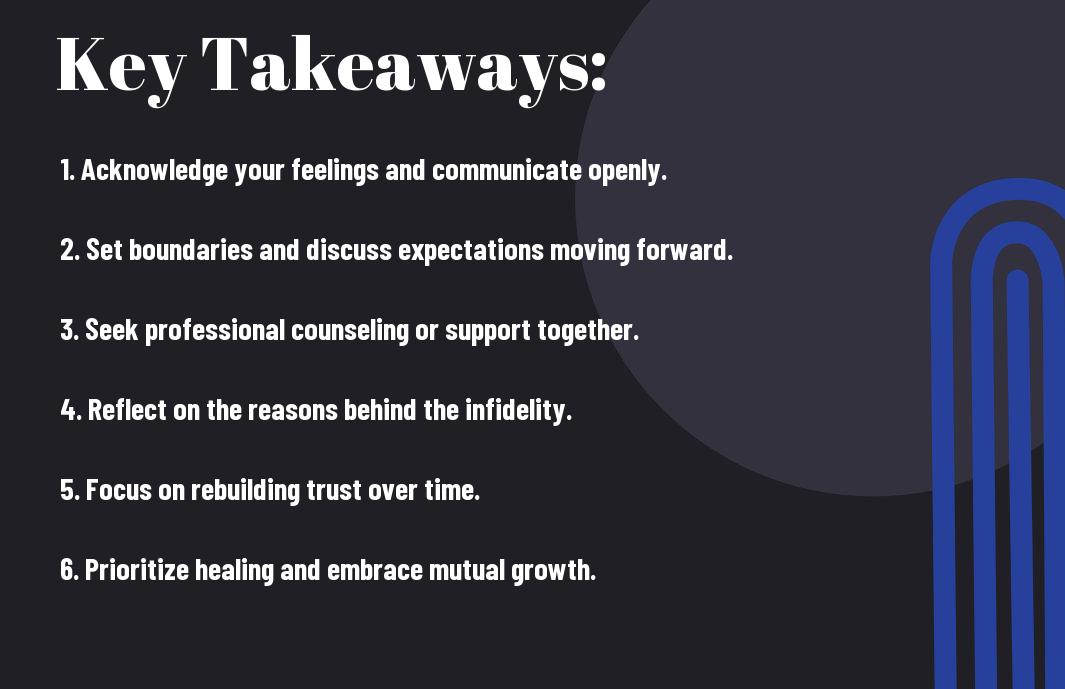Forgiveness is a challenging yet vital step in healing after infidelity. As you navigate the emotional turmoil, it’s necessary to process your feelings and establish a path toward reconciliation. Embracing open communication with your spouse can foster understanding, allowing you to address underlying issues. By setting healthy boundaries and engaging in couples therapy, you’ll enhance the chances of rebuilding trust. Ultimately, this journey demands time, patience, and a commitment to growth—not only as a couple but also individually. With the right approach, moving forward together is not only possible but can lead to a stronger partnership.
Key Takeaways:
- Establish open communication to address feelings and concerns about the infidelity.
- Both partners should actively participate in the healing process to rebuild trust.
- Consider seeking professional help, such as couples therapy, to navigate complex emotions.
- Set clear boundaries and guidelines for the relationship moving forward.
- Practice empathy by trying to understand each other’s perspectives and feelings.
- Take time to reflect individually on personal feelings and needs for the future.
- Focus on rebuilding intimacy and positive experiences to strengthen the relationship.

Understanding Infidelity
For many couples, infidelity is a devastating betrayal that shakes the foundation of trust within a relationship. Understanding the complexity of infidelity is important in navigating through the pain and laying the groundwork for possible healing. It’s often not just about the act itself but the underlying issues that may have contributed to it, which can help you gain clarity and insight as you work towards rebuilding your relationship.
Reasons for Cheating
Before addressing the aftermath of infidelity, it’s important to explore the myriad of reasons a partner may choose to cheat. Common factors include emotional disconnect, unmet needs, and a desire for novelty. In some cases, external pressures, personal insecurities, or life changes can lead a spouse to seek comfort and validation outside of the relationship, making it vital for you to understand the context behind their actions.
Emotional Impact on the Victim
Infidelity can leave you feeling a mix of overwhelming emotions including rage, betrayal, and deep sadness. You may also experience moments of confusion, guilt, and self-doubt, questioning your worth or the decisions you’ve made in your relationship. Recognizing these feelings is important to processing the hurt and beginning to heal from the pain.
Cheating profoundly impacts your emotional well-being, leading to a state of emotional turmoil that can feel insurmountable. You may grapple with feelings of loss and insecurity, struggling to trust your partner or even yourself again. This emotional rollercoaster can affect other areas of your life, such as friendships and work, making it important to address and process these feelings thoroughly. Moving forward requires a conscious effort to heal and understand your emotional landscape better.

Initiating Conversation
There’s no easy way to begin a conversation about infidelity, yet it’s imperative for healing. You need to approach this sensitive subject with honesty and empathy. Start by asking yourself where do I start and how do I forgive a cheater? Establishing a calm environment will help you both express feelings openly and work towards reconciliation.
Creating a Safe Space for Dialogue
Above all, you must create a safe and non-judgmental space for both you and your spouse to share your thoughts. Dim the lights, choose a quiet time, and express your intention for the conversation to be productive. It’s important that both of you feel comfortable sharing your emotional truths without fear of harsh reactions.
How to Discuss Feelings and Expectations
Behind every cheating incident are complicated feelings and unmet expectations that need to be addressed. Start by expressing how the betrayal affected you, using “I” statements to avoid sounding accusatory. Clarify your expectations for the future and what you need from your partner to rebuild trust. By openly discussing these matters, you can create a stronger understanding and foster healing between you both.
Feelings run deep after infidelity, so it’s vital for you to articulate your hurt as well as your desires moving forward. Make your feelings clear and express what you need to rebuild the relationship; this will create a foundation for healing. Focus on specific behaviors and changes you’d like to see, ensuring your spouse understands your perspective. Acknowledging emotions while remaining open to their feelings fosters a mutually supportive environment, paving the way for healing and growth.

The Process of Forgiveness
Once again, it is important to emphasize that forgiveness is not a linear journey but a personal process that takes time and reflection. Entering this stage means confronting the reality of your situation and intentionally choosing to release the pain and betrayal. It requires both partners to actively participate in understanding feelings, addressing the violation of trust, and finding a way to move forward together. Forgiveness doesn’t mean forgetting; it means accepting the situation and making a conscious decision to heal your relationship.
Acknowledging Pain and Betrayal
Above all, it’s imperative for you to acknowledge the deep pain and betrayal that have surfaced. This step involves openly discussing your feelings about the infidelity without fear of judgment. Both you and your spouse need to understand how this breach of trust has affected your emotional well-being and your relationship. Validating your pain is the first move toward rebuilding a foundation strong enough for forgiveness.
Steps to Letting Go of Resentment
To let go of resentment, it’s vital to engage in open communication, practice self-reflection, and seek understanding. You must express your feelings freely and create a dialogue where both partners can share their experiences and feelings about the infidelity. Holding onto resentment only breeds negative emotions, so actively choosing to address and process these feelings is vital. You can also benefit from establishing boundaries and the necessary conditions for rebuilding trust in your marriage.
For instance, taking small, intentional steps can make a significant difference in your healing process. Consider identifying the specific triggers that cause you to relive the hurt and consciously working through them. By allocating time to discuss your feelings, finding supportive resources like therapy, and engaging in activities that reinforce your bond, you can foster a more positive outlook. Regularly check in with yourself and your spouse to ensure your emotional needs are being met, and acknowledge any progress, however small, in your journey toward letting go of resentment.
Rebuilding Trust
Many couples find that rebuilding trust after infidelity takes time, commitment, and open communication. It’s important to approach this process with patience and understanding. You need to recognize that both partners have to put in the effort to regain the lost trust, which may involve sharing feelings and addressing underlying issues that contributed to the breach. You can foster an environment where honesty and vulnerability are encouraged, helping to reinforce your relationship’s foundation.
Establishing Transparency
Among the most effective strategies to rebuild trust is establishing transparency in your relationship. This involves openly sharing details about your daily life and experiences, allowing your partner to feel included and informed. You should practice being honest about your thoughts and feelings, creating a safe space for dialogue. By doing this, you can dispel doubts and misunderstandings, which often lead to insecurity and mistrust.
Setting Boundaries and Expectations
Beside transparency, it’s vital to set clear boundaries and expectations moving forward. Both partners should discuss and agree upon what behaviors are considered acceptable and unacceptable in the relationship. This clarity helps to prevent misunderstandings and reinforces your commitment to rebuild trust.
It is necessary to define specific boundaries that cater to the needs and feelings of both partners while fostering a sense of safety. Discuss whether open communication about social interactions, friendships, or contact with ex-partners is necessary. By establishing these expectations, you will create a healthy framework for your relationship, reinforcing accountability and trust. Ensure that you both routinely assess and adjust these boundaries as needed, maintaining an ongoing conversation that can help deepen your emotional connection.
Seeking Professional Help
Not all couples can navigate the complexities of infidelity alone. Seeking professional help can provide the support and guidance needed to work through challenges and rebuild trust. A trained therapist can facilitate open dialogue, help you understand the underlying issues, and equip you with effective communication tools. Investing in therapy can ultimately pave the way for healing and a stronger relationship.
Couples Therapy Benefits
About couples therapy, it offers a safe space for both partners to express feelings and concerns while being guided by a neutral third party. You’ll gain insights into your relationship dynamics, and discover coping strategies to manage conflict. Therapy can foster empathy and understanding, allowing you to move forward with a renewed sense of connection.
Finding the Right Therapist
Around you, there are many qualified therapists, so it’s crucial to find one that aligns with your needs and values. Look for a professional experienced in dealing with infidelity and relationship issues. Check their credentials, read reviews, and consider scheduling consultations to gauge compatibility. It’s imperative that you feel comfortable and understood, as this will help facilitate a productive therapy experience.
Right away, focus on finding a therapist who not only has expertise in relationship challenges but also creates a supportive environment. Look for someone who encourages open communication and values both partners’ perspectives. It’s important to trust your instincts; a good therapist will make you feel safe and heard. Be sure to discuss treatment approaches and ensure their methodology aligns with your goals for therapy. The right match can significantly enhance your journey toward healing and building a stronger relationship.
Moving Forward Together
Despite the challenges that arise after infidelity, you can choose to move forward together as a stronger couple. This journey requires patience, intentional effort, and the willingness to rebuild your relationship from the ground up. By focusing on the future and taking each step as a team, you can not only heal but also discover a deeper connection that transcends the pain of the past.
Building a New Foundation
Against the backdrop of betrayal, it’s important to establish a new foundation based on trust and mutual respect. This means acknowledging past mistakes, but also focusing on how to create a healthier relationship moving forward. Make a commitment to be vulnerable with each other and establish shared goals that reflect your growth as partners.
Cultivating Open Communication
Among the most important elements of rebuilding your relationship is open communication. You must foster an environment where both partners feel safe to express their feelings without judgment. This openness allows you to address underlying issues and prevents the accumulation of resentment, opening the door for healing.
Indeed, cultivating open communication involves active listening and being fully present during conversations. You should prioritize expressing your feelings and concerns honestly while encouraging your spouse to do the same. Honesty is necessary, as it lays the groundwork for a transparent dialogue. Both partners must also practice empathy, striving to understand each other’s perspectives. By doing so, you build a strong bond and establish a partnership where trust can flourish, making it possible to overcome the scars of infidelity together.
Conclusion
Summing up, forgiving a cheating spouse and moving forward together involves honest communication, rebuilding trust, and allowing yourself and your partner the space to heal. You must confront your feelings, set boundaries, and engage in joint efforts to strengthen your relationship. Prioritize time together, stay open to counseling if needed, and acknowledge that healing is a gradual process. By taking these steps, you can pave the way for a renewed, more resilient partnership.
FAQ
Q: What are the first steps I should take after discovering my spouse’s infidelity?
A: The initial response to discovering infidelity can be overwhelming. Start by allowing yourself to feel and process the emotions that arise. It’s important to communicate openly with your spouse about your feelings, without placing immediate judgment. Seeking counseling, either individually or as a couple, can provide a supportive environment to discuss the underlying issues and begin the healing process.
Q: How can I rebuild trust after a betrayal?
A: Rebuilding trust takes time and effort from both partners. The unfaithful spouse should be transparent about their actions and demonstrate a commitment to change. This includes being open about their whereabouts and making an effort to rekindle intimacy and connection. The other partner should engage in the healing process with patience and give themselves time to heal, recognizing that trust is rebuilt through consistent actions over time.
Q: Is it possible to move forward in the relationship, and if so, how?
A: Yes, it is possible to move forward, but it requires commitment from both partners. Establish clear boundaries and communicate openly about your needs and expectations. Focus on strengthening your emotional connection through shared activities, quality time, and ongoing communication. Professional counseling can aid in managing feelings and providing tools for a healthier relationship moving forward.
Q: How do I handle my feelings of anger and resentment towards my spouse?
A: Feeling anger and resentment is a natural response to betrayal. It’s important to express these feelings constructively, whether through therapy, journaling, or discussing them with your partner. Engaging in activities that promote self-care, such as exercise or hobbies, can also help manage these emotions. Channeling anger into positive actions can be beneficial for personal healing and relationship growth.
Q: When is it time to consider ending the relationship?
A: Reflecting on the viability of the relationship is necessary if feelings of anger, hurt, and betrayal persist without resolution. Consider ending the relationship if there is a lack of commitment to change from your spouse, ongoing deceit, or if you find no progress in rebuilding trust and intimacy. Seeking professional guidance can help clarify your feelings and provide perspective on whether to continue or part ways.
